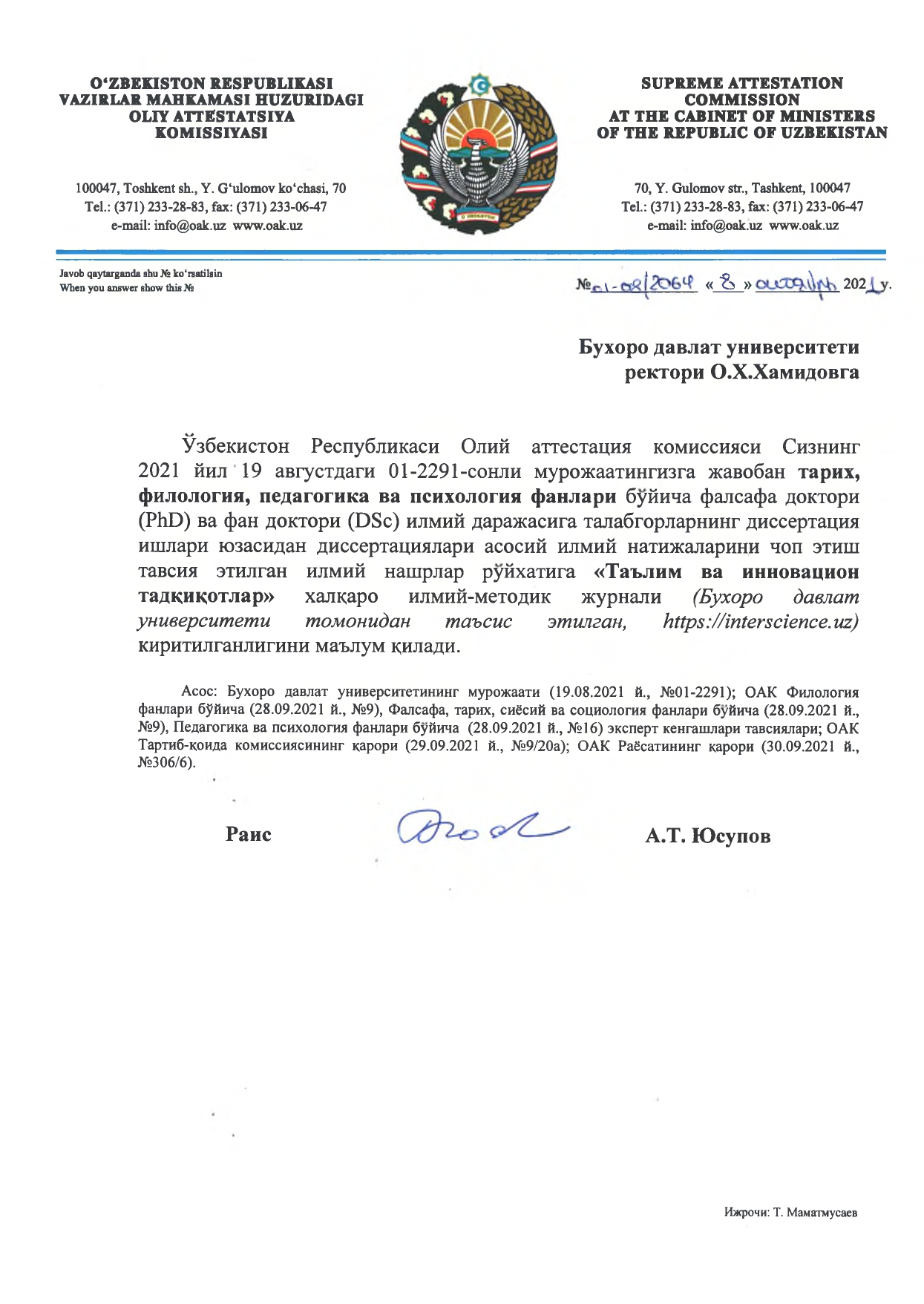OLIY TA’LIM MUASSASALARI PROFESSOR-O’QITUVCHILARI KASBIY FAOLIYATINI TALABALARNING QONIQISHI KO’RSATKICHLARI ASOSIDA BAHOLASH TEXNOLOGIYASI
Ibraimov Xolboy, Qori Niyoziy nomidagi O’zbekiston Pedagogika fanlari ilmiy tadqiqot instituti direktori, pedagogika fanlari doktori, professor. Urakov Sherzod Raxmanovich, SamDU Kattaqo’rg’on filiali direktori, pedagogika fanlari bo’yicha falsafa doktori (PhD)
Ключевые слова:
OTM ta’lim muhiti, talaba qoniqishi, ta’lim oluvchilar, OTM obro’si, pedagogik bilim va madaniyat, pedagogik mahorat, talabalarni qo’llab-quvvatlash, talabalar bilimini baholashАннотация
Mazkur maqolada oliy ta’lim muassasalarida ta’lim xizmatlarini sifatini oshirish, xususan professor-o’qituvchilar faoliyatini takomillashtirishda faoliyatning eng muhim samaradorlik ko’rsatkichlari (KPI) tizimini takomillashtirish yo’nalishlari tahlil qilingan. Shu asosda OTM professor-o’qituvchilarining kasbiy faoliyatini talabalarning qoniqishi ko’rsatkichlari asosida baholash texnologiyasi taklif etilgan. Professor-o’qituvchilar kasbiy faoliyatini baholashning latent omillari va ularga oid ko’rsatkichlar ishlab chiqilgan.
Библиографические ссылки
Rahmatov M.A., Zaripov B.Z. Iste’dodli insonlar mamlakatning bebaho boyligidir. Li Kuan Yu hikmatlari. – T.: “Zamin Nashr”, 2019. – 6-bet.
Dehghan A., J. Dugger, D. Dobrzykowski, and A. Balazs, “The antecedents of student loyalty in online programs”, Int. J. Educ.
Manag., vol. 28, no. 1, pp. 15-35, 2014.
Hoverstad R., R.Sylvester, and K. E.Voss, “Key Factors Influencing Student Satisfaction Related to Recruitment and Retention”, no. november 2014. pp. 37-41, 2008.
Khoo H., Susie and S.T.Gregor, “Service quality and student/customer satisfaction in the private tertiary education sector in Singapore”. Int. J.Educ. Manag., vol. 31, no. 4, pp. 430-444, 2017
Lesley L., S.Kalafatis “The idiosyncratic behavior of service quality, value, satisfaction, and intention to recommend in higher education: An empirical examination”. Journal of Marketing Management Vol. 27, Nos. 11-12, October, 2011.
Masserini L., M.Bini, and M.Pratesi, “Do Quality of Services and Institutional Image Impact Students’ Satisfaction and Loyalty in Higher Education?”, Soc. Indie. Res., vol. 146, no. 1-2, pp. 91-115, 2019
Chapman V., and A. Doris, “Modelling higher education financing reform for Ireland”. Econ. Educ. Rev., vol. 71, pp. 109-119, 2019.
Allam Z., “Demystifying the Aspect of Quality in Higher Education: Insights From Saudi Arabia”. SAGE Open, vol. 10, no. 1, 2020.
Iacovidou M., P.Gibbs, and A.Zopiatis, “An exploratory use of the stakeholder approach to defining and measuring quality: The case of a cypriot higher education institution”. Qual. High. Educ, vol. 15, no. 2, pp. 147-165, 2009.
Dagayeva I. A., Baxotskiy V. V., Strikunova L. I. Diagnostika udovletvorennosti studentov obrazovatelnoy sredoy vuza v selyax povыsheniya yego privlekatelnosti dlya abituriyentov // Vestnik Surgutskogo gosudarstvennogo universiteta. 2022. № 2 (36). S. 42–50. DOI 10.34822/2312-3419-2022-2-42-50
Husenov S., Haydarov R., Xushvaqtov X., Qodirov M., Boboyev N. Professor-o’qituvchilarning dars jarayonidagi faoliyatini baholash. Monografiya. – Samarqand: “FAN BULOG’I” nashriyoti, 2021. – 120 B.





